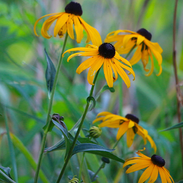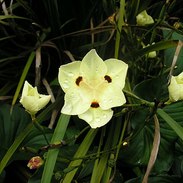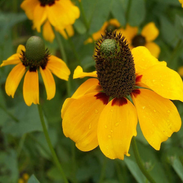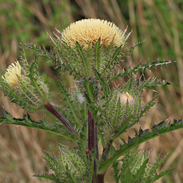
Chickweed (Stellaria media), also known as winterweed, birdweed, and chickenwort, is a flowering plant in the carnation family. It is native to Eurasia and North Africa, but is found throughout the United States. Chickweed is a winter annual that is mostly found during fall, winter, and early spring. It has white, star-shaped flowers that are held on a leafless scape. The fruit is a capsule with many tiny seeds.
Traditional Uses:
While specific medicinal uses of Chickweed are not widely documented, it has been used as a folk remedy for centuries for many conditions, including asthma, blood disorders, conjunctivitis, constipation, inflammation, dyspepsia, skin ailments, and obesity. Chickweed extract has been used internally as a demulcent, but is more typically used externally for the treatment of rashes and sores. The young shoots are edible and have been used as salad greens. In homeopathy, the plant is used to relieve rheumatic pains and psoriasis. The chickweed leaf has been known to contain flavonols, including quercetin and rutin. It also contains small amounts of vitamin C. Some studies that have been done on chickweed include:
• Yaseen B, Gangwar C, Nayak R, Sarkar J, Naik RM. Phytochemical synthesis of PdNPs utilizing Stellaria media/Chick weed: A Chinese medicinal herb for its antioxidant and catalytic application. Inorganic Chemistry Communications. 2023;155:111058. doi:10.1016/j.inoche.2023.111058
• Rani N, Vasudeva N, Sharma SK. Quality assessment and anti-obesity activity of Stellaria media (Linn.) Vill. BMC Complement Altern Med. 2012;12:145. doi:10.1186/1472-6882-12-145
• Oladeji OS, Oyebamiji AK. Stellaria media (L.) Vill.- A plant with immense therapeutic potentials: phytochemistry and pharmacology. Heliyon. 2020;6(6):e04150. doi:10.1016/j.heliyon.2020.e04150
• Demján V, Sója A, Kiss T, et al. Stellaria media tea protects against diabetes-induced cardiac dysfunction in rats without affecting glucose tolerance. J Tradit Complement Med. 2021;12(3):250-259. doi:10.1016/j.jtcme.2021.08.003
It's important to note that these studies are all preliminary.
Potential Herbal Actions:
Scientific research is limited, but potential herbal actions may be:
• Demulcent: Soothes and protects irritated tissue
• Anti-inflammatory: Helps the body to control inflammation
• Alterative: Restores the proper function of the body and increase health and vitality
• Expectorant: Help the body to remove excess mucus from the lungs
• Laxative: Helps increase bowel movement
• Diuretic: Increases the secretion & elimination of urine from the body
Cautions and Considerations:
• Limited Research: It's crucial to remember that research specifically on Chickweed is limited, and its safety and efficacy haven't been fully established.
• Allergies: As with any plant, some individuals may be allergic to Chickweed
• Pregnancy and Breastfeeding: Pregnant and breastfeeding women should avoid using it due to a lack of safety data.
• Sustainable Harvesting: If you plan to wildcraft Chickweed, ensure you do so sustainably and with respect for the environment.
Disclaimer: This blog post is for informational purposes only and should not be considered medical advice. Always consult 1 with a qualified healthcare professional 2 before using any herbal remedies.













Thanks for sharing with us, and including the supporting scientific articles. I was able to learn a lot from your post.